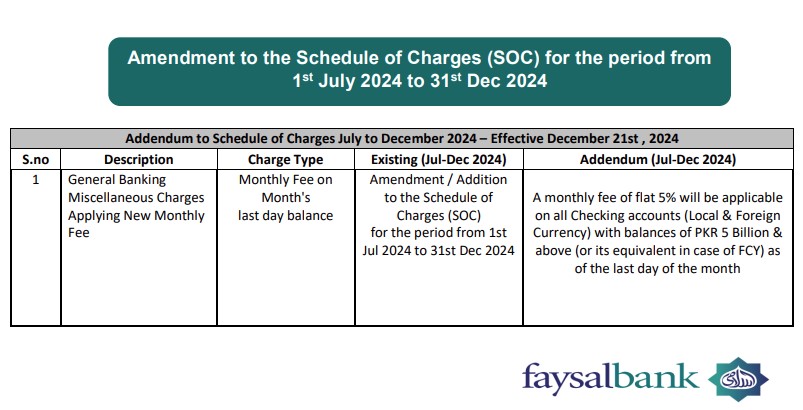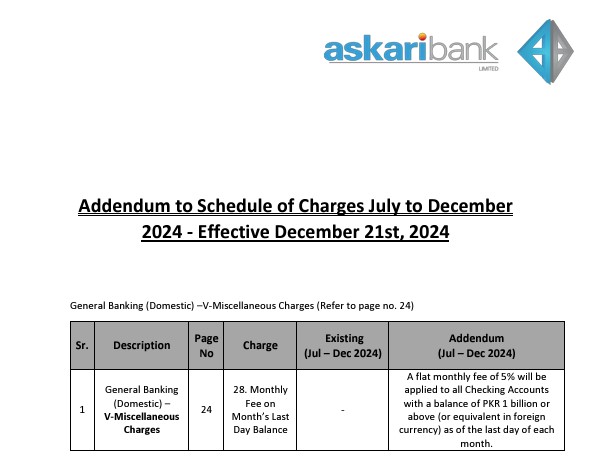Pakistani banks have started imposing fees on large savings accounts to meet the government’s Advance-to-Deposit Ratio (ADR) requirement and avoid additional taxation.
The move is part of a broader strategy to boost private sector lending amid mounting fiscal pressures. The first bank to do this was Bank Alfalah, which announced a monthly fee on the 15th of November.
Other banks quickly followed, the Habib Bank Limited (HBL) and Bank of Punjab (BoP) announcing similar fees on the 18th of November.
Meezan Bank Ltd., Pakistan’s largest lender by profit, announced a 5% monthly fee on savings accounts holding over Rs1 billion ($3.6 million).
“Meezan Bank has the right to recover a monthly fee of 5% on deposit accounts where the balance on the last day of the month of an account is PKR 1 billion and above (or equivalent in case of foreign currency),” read a notice issued by the bank.
MCB Bank Limited said in a notice that a 5% monthly fee will be applied to all Checking Accounts (Savings and Current accounts) with a balance of PKR 3 Billion or above (or its equivalent in case of foreign currency) as of the last day of the month.

Faysal Bank stated that a flat 5% monthly fee will be charged on all checking accounts, including both local and foreign currency accounts, with balances of PKR 5 billion or higher (or equivalent in foreign currency) at the end of the month.

Askari Bank disclosed that a flat 5% monthly fee will apply to all checking accounts holding a balance of PKR 1 billion or above (or equivalent in foreign currency) as of the month’s last day.

JS Bank announced that a 5% monthly fee, effective December 20, 2024, will be imposed on all savings accounts with balances of PKR 2 billion or more (or equivalent in foreign currency) as of the last day of each month.
 The Federal Board of Revenue (FBR) plans to impose penalties on banks failing to meet the mandatory 50% ADR threshold by year-end. While some banks have secured temporary court relief, they argue that such taxation interferes with their supervision by the central bank.
The Federal Board of Revenue (FBR) plans to impose penalties on banks failing to meet the mandatory 50% ADR threshold by year-end. While some banks have secured temporary court relief, they argue that such taxation interferes with their supervision by the central bank.
According to a report published by Profit, “At its core, the Advance-to-Deposit Ratio (ADR) measures a bank’s lending activity relative to its deposits. The advances refer to lending to the private sector (businesses or individuals) and deposits are the money customers park in the bank through current accounts, savings accounts, or term/fixed deposits. Banks pay interest on some deposits (like savings or fixed deposits) and use this money to either lend to the private sector or invest in government securities. Ideally, a healthy ADR reflects a bank actively lending to fuel economic activity.”
As of October 25, the sector’s gross advance-to-deposit ratio stood at 44%, with none of the 11 major banks meeting the 50% benchmark, according to Karachi-based JS Global Capital Ltd.
“Banks are aggressively pursuing lending targets while discouraging large deposits to avoid higher taxes,” said Suleman Rafiq Maniya, a Karachi-based wealth manager. “Direct discouragement isn’t feasible, so banks are leveraging fees to limit inflows.”
The move aligns with Pakistan’s broader fiscal goals under its $7 billion International Monetary Fund (IMF) loan program, which requires a record 40% revenue increase. The banking sector is seen as a key player in achieving these ambitious targets.




